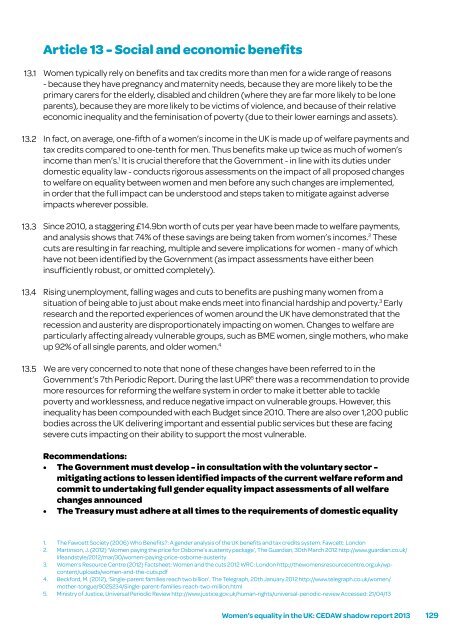Women’s equality in the UK – A health check
Women’s equality in the UK – A health check
Women’s equality in the UK – A health check
Create successful ePaper yourself
Turn your PDF publications into a flip-book with our unique Google optimized e-Paper software.
13.1<br />
13.2<br />
13.3<br />
13.4<br />
13.5<br />
Article 13 - Social and economic benefits<br />
Women typically rely on benefits and tax credits more than men for a wide range of reasons<br />
- because <strong>the</strong>y have pregnancy and maternity needs, because <strong>the</strong>y are more likely to be <strong>the</strong><br />
primary carers for <strong>the</strong> elderly, disabled and children (where <strong>the</strong>y are far more likely to be lone<br />
parents), because <strong>the</strong>y are more likely to be victims of violence, and because of <strong>the</strong>ir relative<br />
economic <strong>in</strong><strong>equality</strong> and <strong>the</strong> fem<strong>in</strong>isation of poverty (due to <strong>the</strong>ir lower earn<strong>in</strong>gs and assets).<br />
In fact, on average, one-fifth of a women’s <strong>in</strong>come <strong>in</strong> <strong>the</strong> <strong>UK</strong> is made up of welfare payments and<br />
tax credits compared to one-tenth for men. Thus benefits make up twice as much of women’s<br />
<strong>in</strong>come than men’s. 1 It is crucial <strong>the</strong>refore that <strong>the</strong> Government - <strong>in</strong> l<strong>in</strong>e with its duties under<br />
domestic <strong>equality</strong> law - conducts rigorous assessments on <strong>the</strong> impact of all proposed changes<br />
to welfare on <strong>equality</strong> between women and men before any such changes are implemented,<br />
<strong>in</strong> order that <strong>the</strong> full impact can be understood and steps taken to mitigate aga<strong>in</strong>st adverse<br />
impacts wherever possible.<br />
S<strong>in</strong>ce 2010, a stagger<strong>in</strong>g £14.9bn worth of cuts per year have been made to welfare payments,<br />
and analysis shows that 74% of <strong>the</strong>se sav<strong>in</strong>gs are be<strong>in</strong>g taken from women’s <strong>in</strong>comes. 2 These<br />
cuts are result<strong>in</strong>g <strong>in</strong> far reach<strong>in</strong>g, multiple and severe implications for women - many of which<br />
have not been identified by <strong>the</strong> Government (as impact assessments have ei<strong>the</strong>r been<br />
<strong>in</strong>sufficiently robust, or omitted completely).<br />
Ris<strong>in</strong>g unemployment, fall<strong>in</strong>g wages and cuts to benefits are push<strong>in</strong>g many women from a<br />
situation of be<strong>in</strong>g able to just about make ends meet <strong>in</strong>to f<strong>in</strong>ancial hardship and poverty. 3 Early<br />
research and <strong>the</strong> reported experiences of women around <strong>the</strong> <strong>UK</strong> have demonstrated that <strong>the</strong><br />
recession and austerity are disproportionately impact<strong>in</strong>g on women. Changes to welfare are<br />
particularly affect<strong>in</strong>g already vulnerable groups, such as BME women, s<strong>in</strong>gle mo<strong>the</strong>rs, who make<br />
up 92% of all s<strong>in</strong>gle parents, and older women. 4<br />
We are very concerned to note that none of <strong>the</strong>se changes have been referred to <strong>in</strong> <strong>the</strong><br />
Government’s 7th Periodic Report. Dur<strong>in</strong>g <strong>the</strong> last UPR 5 <strong>the</strong>re was a recommendation to provide<br />
more resources for reform<strong>in</strong>g <strong>the</strong> welfare system <strong>in</strong> order to make it better able to tackle<br />
poverty and worklessness, and reduce negative impact on vulnerable groups. However, this<br />
<strong>in</strong><strong>equality</strong> has been compounded with each Budget s<strong>in</strong>ce 2010. There are also over 1,200 public<br />
bodies across <strong>the</strong> <strong>UK</strong> deliver<strong>in</strong>g important and essential public services but <strong>the</strong>se are fac<strong>in</strong>g<br />
severe cuts impact<strong>in</strong>g on <strong>the</strong>ir ability to support <strong>the</strong> most vulnerable.<br />
Recommendations:<br />
• The Government must develop - <strong>in</strong> consultation with <strong>the</strong> voluntary sector -<br />
mitigat<strong>in</strong>g actions to lessen identified impacts of <strong>the</strong> current welfare reform and<br />
commit to undertak<strong>in</strong>g full gender <strong>equality</strong> impact assessments of all welfare<br />
changes announced<br />
• The Treasury must adhere at all times to <strong>the</strong> requirements of domestic <strong>equality</strong><br />
1. The Fawcett Society (2006) Who Benefits?: A gender analysis of <strong>the</strong> <strong>UK</strong> benefits and tax credits system. Fawcett: London<br />
2. Mart<strong>in</strong>son, J. (2012) ‘Women pay<strong>in</strong>g <strong>the</strong> price for Osborne’s austerity package’, The Guardian, 30th March 2012 http://www.guardian.co.uk/<br />
lifeandstyle/2012/mar/30/women-pay<strong>in</strong>g-price-osborne-austerity<br />
3. <strong>Women’s</strong> Resource Centre (2012) Factsheet: Women and <strong>the</strong> cuts 2012 WRC: London http://<strong>the</strong>womensresourcecentre.org.uk/wpcontent/uploads/women-and-<strong>the</strong>-cuts.pdf<br />
4. Beckford, M. (2012), ‘S<strong>in</strong>gle-parent families reach two billion’. The Telegraph, 20th January 2012 http://www.telegraph.co.uk/women/<br />
mo<strong>the</strong>r-tongue/9025234/S<strong>in</strong>gle-parent-families-reach-two-million.html<br />
5. M<strong>in</strong>istry of Justice, Universal Periodic Review http://www.justice.gov.uk/human-rights/universal-periodic-review Accessed: 21/04/13<br />
<strong>Women’s</strong> <strong>equality</strong> <strong>in</strong> <strong>the</strong> <strong>UK</strong>: CEDAW shadow report 2013 129


